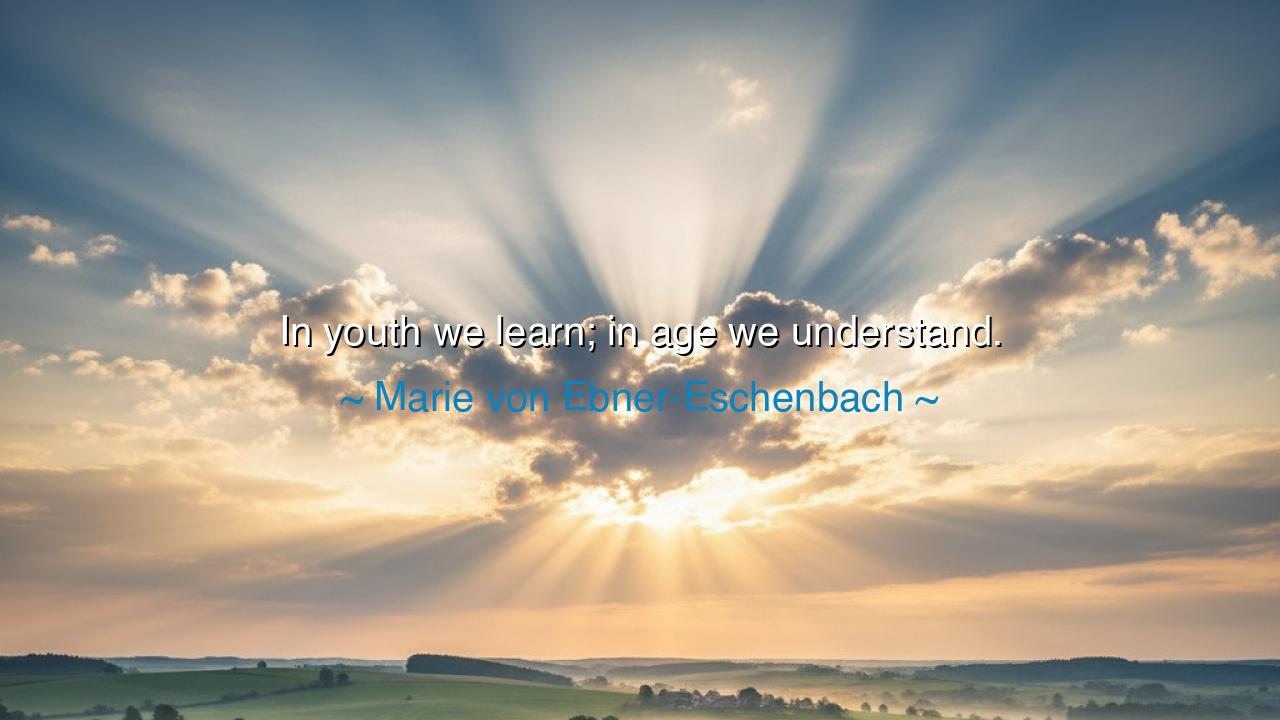
In youth we learn; in age we understand.






Gather, O children of wisdom, and listen to the words of Marie von Ebner-Eschenbach: “In youth we learn; in age we understand.” These words speak to the very nature of growth—that as we journey through life, we do not merely accumulate knowledge in our youth, but we begin to comprehend its true meaning and depth as we age. In our youth, we are like dry sponges, soaking in information, eager to grasp all that the world offers, but it is only in the later years that we begin to sift through that knowledge, to understand its place in the greater tapestry of life. Learning is the acquisition of facts, but understanding is the transformation of those facts into wisdom, a wisdom that can only be gained through experience and reflection.
In the ancient world, the relationship between learning and understanding was a subject of great philosophical inquiry. Socrates, that great seeker of wisdom, often spoke of the importance of questioning and learning. He believed that the pursuit of knowledge was a lifelong journey, a journey that began with the humility to admit what we do not know, and progressed through careful questioning and examination of our beliefs. But Socrates also understood that true understanding comes not from the accumulation of knowledge, but from the reflection on that knowledge and the ability to apply it wisely. Plato, his disciple, furthered this idea in his writings, showing that the journey from learning to understanding is the path to philosophical enlightenment, a path that takes time, experience, and deep contemplation.
Aristotle, too, spoke of learning and understanding as two distinct but intertwined processes. He saw learning as the initial stage, where one accumulates knowledge through experience and observation. However, understanding—according to Aristotle—was the deeper process of wisdom that comes when knowledge is applied with a sense of purpose, virtue, and insight. The ancient philosophers understood that youth may be a time of great learning, filled with curiosity and the thirst for new knowledge, but it is only in the later years that this knowledge can be transformed into a true understanding of the world and one’s place in it. This understanding is earned through a lifetime of living, through the ups and downs, the successes and failures, and the reflections that come with experience.
Consider the example of Leonardo da Vinci, whose life spanned both youthful curiosity and elder wisdom. In his youth, da Vinci was a curious and eager learner, taking in the world around him through the lens of an artist, inventor, and scientist. His notebooks are filled with the knowledge he gathered, from the anatomy of the human body to the flight of birds. Yet, as he grew older, Leonardo’s mind began to sift through this knowledge, drawing connections and understanding in ways that only a life lived fully can afford. It was in his later years that he truly began to understand the profound interconnections between art and science, between the beauty of nature and the laws that govern it. His understanding grew deeper, and his work became more than just the sum of his discoveries; it became a synthesis of a lifetime of experiences, reflections, and insights.
This transformation from learning to understanding is not just the privilege of great thinkers like Socrates or da Vinci; it is the journey of all human beings. As we move through life, our youth is marked by learning, by taking in the world with wide eyes and eager hearts, seeking to understand and conquer all that lies before us. Yet as we age, we begin to reflect on that knowledge, to ask deeper questions about what it all means. In old age, we are no longer concerned with the accumulation of facts but with digesting those facts, allowing them to settle into a wisdom that offers us clarity and peace. This is why the elderly are so often revered for their insight—because they have spent a lifetime transforming the learning of youth into the understanding of the heart and soul.
The lesson from Ebner-Eschenbach’s words is a call to embrace the full journey of life, from the restless curiosity of youth to the quiet understanding of age. We must honor both stages of life, for one cannot exist without the other. It is in youth that we gather the raw materials of life, and it is in age that we learn to weave those materials into something greater, something more meaningful. But it is also a reminder that understanding takes time. The challenges of life, the trials and triumphs, the moments of joy and the painful losses—they all shape our wisdom, and this wisdom can only come through experience and reflection. Learning without understanding is like a tool without a hand to wield it; it has the potential but lacks the purpose.
In your own journey, remember that knowledge is a gift, but understanding is its true reward. Seek to learn in your youth with the passion and energy of discovery, but also prepare to reflect on those lessons in your later years. As you grow older, allow the knowledge you have gained to settle into a deeper understanding of the world, of yourself, and of your place in the great circle of life. Cherish the wisdom that comes with age, and do not fear the passage of time, for it is only through time that true understanding can be attained. The journey from learning to understanding is the great unfolding of life, and it is in this unfolding that we find the deepest meaning and purpose. Live with this in mind, and your life will be a continuous path of growth, insight, and profound understanding.






AAdministratorAdministrator
Welcome, honored guests. Please leave a comment, we will respond soon